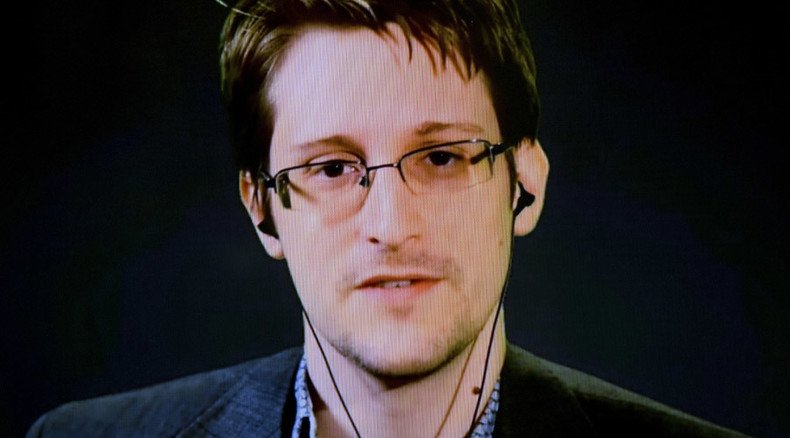‘Blood on his hands’: CIA officials, others implicate Snowden disclosures in Paris attack

The violence in Paris has prompted former and current CIA directors, and even a presidential candidate, to blame the inability to thwart attacks on “unauthorized disclosures” by NSA whistleblower Edward Snowden, despite admitting intelligence failures.
“In the past several years, because of a number of unauthorized disclosures and a lot of handwringing over the government’s role in the effort to try to uncover these terrorists, there have been some policy and legal and other actions that are taken to make our ability collectively internationally to find these terrorists much more challenging…” CIA Director John Brennan told a reporter who asked how the Paris attack had happened when the world’s leading intelligence agencies “didn’t even catch a whiff of it as far as we’re to understand.”
"[G]lobal #intelligence#community hamstrung...in the the wake of #Snowden revelations on govn't surveillance."https://t.co/oaPYzJltE1#PBS
— DBS Law (@dbslaw) November 16, 2015Brennan was speaking at the Center for Strategic and International Studies on Monday.
Former Florida Governor Jeb Bush, a Republican presidential candidate, also called for restoring the National Security Agency’s ability to vacuum up telephone and internet records, which Congress restricted in a June rewrite of the 2001 Patriot Act, following public outcry over government spying on Americans.
Patriot Act Part Duhhh https://t.co/HdjG1ItPLE
— Parag Gupta (@Parag_Gupta) November 17, 2015Former director of the CIA James Woolsey was even more forceful, telling MSNBC that Snowden has “blood on his hands” because the leaks gave terrorists information about how they were being tracked, leading them to change their behavior.
Former White House Press Secretary Dana Perino concurred, but was apparently not angry enough to fully enunciate the curse in her thoughts in her tweeting, “Also, F Snowden. F him to you know where and back.”
Also, F Snowden. F him to you know where and back.
— Dana Perino (@DanaPerino) November 14, 2015The first to take part in the “Snowden’s fault game,” as described by journalist Glenn Greenwald, was former CIA Deputy Director Michael Morell.
“We’ve had a public debate. That debate was defined by Edward Snowden, right, and the concern was privacy. I think we’re now going to have another debate about that. It’s going to be defined by what happened in Paris,” he said on CBS’ Face the Nation on Sunday
Even London Mayor Boris Johnson got into the act, saying Snowden effectively taught terrorists “how to avoid being caught.”
“To some people the whistleblower Edward Snowden is a hero; not to me,” he wrote in the Daily Telegraph on Sunday. “It is pretty clear that his bean-spilling has taught some of the nastiest people on the planet how to avoid being caught; and when the story of the Paris massacre is explained, I would like a better understanding of how so many operatives were able to conspire, and attack multiple locations, without some of their electronic chatter reaching the ears of the police.”
‘@Snowden taught terrorists how to avoid being caught’ – Boris Johnson https://t.co/O2Lcwm9P0kpic.twitter.com/yj7h4LQVzK
— RT UK (@RTUKnews) November 16, 2015The Intercept’s Greenwald, however, was quick to provide counterweight to the “Snowden’s fault game,” writing that “terrorists” knew their communications were being monitored long before the Snowden revelations.
“One key premise here seems to be that prior to the Snowden reporting, The Terrorists helpfully and stupidly used telephones and unencrypted emails to plot, so Western governments were able to track their plotting and disrupt at least large-scale attacks. That would come as a massive surprise to the victims of the attacks of 2002 in Bali, 2004 in Madrid, 2005 in London, 2008 in Mumbai, and April 2013 at the Boston Marathon,” wrote Glenn Greenwald.
“How did the multiple perpetrators of those well-coordinated attacks — all of which were carried out prior to Snowden’s June 2013 revelations — hide their communications from detection?”
Greenwald said that what Snowden’s revelations did do was reveal that the NSA and its allies “were collecting everyone else’s internet communications and activities.”
Anyone claiming this is either incredibly ignorant or incredibly dishonest. Or both https://t.co/p67RW9DHo8https://t.co/OtiFcT6CWT
— Glenn Greenwald (@ggreenwald) November 16, 2015Less reported, however, were other comments made by CIA Director Brennan during Monday’s appearance. He said the agency has been able to uncover and thwart many terrorist operations before they were carried out, and also disclosed what intelligence officials did know about the Paris attack
“…I can tell you that it’s not a surprise that this attack was carried out from the standpoint of we did have strategic warning. We knew that these plans or plotting by ISIL was underway, looking at Europe in particular as the venue for carrying out these attacks,” said Brennan.
“But I must say that there has been a significant increase in the operational security of a number of these operatives and terrorist networks as they have gone to school on what it is that they need to do in order to keep their activities concealed from the authorities,” he added.
#ISIS ordered attack on anti-ISIS coalition, Iraq warned France 1 day before #ParisAttackshttps://t.co/aF45XyROCOpic.twitter.com/VOVqoLo9Ih
— RT (@RT_com) November 16, 2015New information that former CIA Director George Tenet disclosed in an interview with Politico has revealed that the CIA was similarly well-informed about Al-Qaeda’s 9/11 plot against the United States.
‘They’re coming here’: Bush admin. ignored multiple pre-9/11 warnings – report https://t.co/xQ5ZMOeCggpic.twitter.com/IyFJOkwje2
— RT America (@RT_America) November 14, 2015











